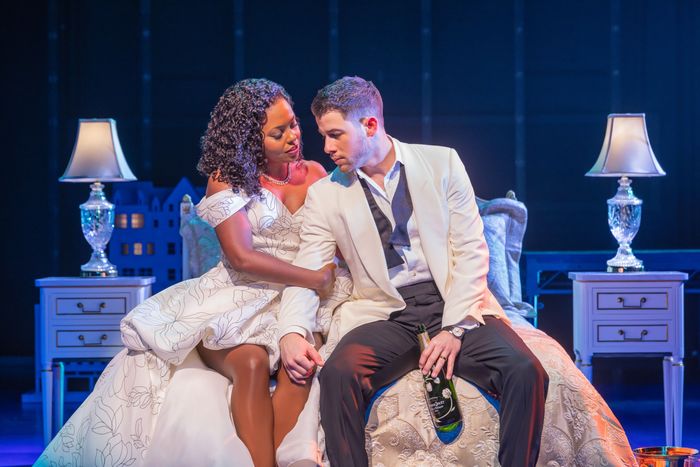
Adrienne Warren and Nick Jonas in The Last Five Years.
Photo: Matthew Murphy
The notion of “I’ve been a jerk but I realize it and will benefit from it anyway” captures a distinct essence, especially prominent in 2001. This period introduced us to Jason Robert Brown’s The Last Five Years, a minimalist take on Merrily We Roll Along that resonates with the Gen X to millennial transition, and remains a cherished work in theaters, especially among aspiring actors and university drama programs. In 1999, Brown, at just 29, had already secured a Tony for Parade, though his marriage to actress Theresa O’Neill was falling apart. This backdrop led to his creation of a poignant two-character narrative exploring a marriage’s unraveling involving a young, rising Jewish writer and his partner, an actress stuck in summer stock. Art did little to heal personal wounds; O’Neill counter-sued Brown after he filed for his own lawsuit against her. The New York premiere at Lincoln Center was ultimately canceled, possibly due to these legal troubles, and Brown modified a song to lessen the resemblance of the female character to O’Neill, despite claims that the story wasn’t autobiographical.
Fast forward to today, and the storyline remains challenging for performers: how to intricately portray its main characters. Cathy, the actress, begins her journey in reverse, moving from despair to their first enchanting encounter, while Jamie, the writer, follows a forward trajectory, starting as a budding novelist excited about his success and culminating as a unfaithful spouse. He transitions from an infatuated artist to a notable figure who, regrettably, discards his wedding ring and leaves a note to his wife. The rise and fall cycle is reminiscent of struggles seen in other successful artists.
Whitney White’s recent revival emanates sophistication and simplicity, with Stacey Derosier’s lighting artfully highlighting the distinct temporal shifts within the narrative. Nevertheless, the production grapples with how to portray the central character’s flaws. The emotional heart of this rendition undoubtedly belongs to Cathy, played brilliantly by Adrienne Warren. Her immense talent and sincere portrayal of Cathy’s frustrations serve as a stark reminder of the countless gifted individuals striving against an industry that often overlooks them. During her harrowing auditions in “Climbing Uphill,” the painful truth of her situation resonates deeply, leading to an almost unbearable examination of the auditioning process.
Why is that man staring at my résumé?
Don’t stare at my résumé.
I made up half my résumé.
Look at me…
No, not at my shoes.
Don’t look at my shoes —
I hate these fucking shoes.
Why did I pick these shoes?
Why did I pick this song?
Why did I pick this career? …
Why am I working so hard?
These are the people who cast NeNe Leakes in a musical.
In earlier performances, NeNe Leakes embodied a role similar to Linda Blair’s, showcasing the show’s evolution amid the amusement of celebrity casting. Whether the creative team is aware of the irony of featuring Nick Jonas as Jamie remains unclear. Jonas gives a commendable effort, yet his character lacks dimension, making it difficult for the audience to divert their emotional investment from Warren’s Cathy. While Jonas excels in upbeat sections, his lower vocal range can be harder to follow. However, the main issue lies in how one-dimensional Jamie appears, fitting basic stereotypes of a privileged white male. He is ambitious, Cathy is dependent, and he engages in infidelity while she yearns for stability.
The lyrics penned by Brown carry a biting honesty, revealing the uncomfortable dynamics in relationships where one feels overshadowed by the other’s success. Unfortunately, White and Jonas fail to portray a genuinely complex or empathetic version of Jamie. From the beginning of his career to later encounters with Cathy, Jonas’s performances convey little more than superficial triumph, lacking depth. Despite moments where Jamie seems to confront Cathy’s fears, his stance appears self-centered rather than an empathetic discussion of their relational imbalance.
“There’s no message to the show,” Brown once shared, “It’s just a narrative of two individuals desperately attempting to connect while consistently failing.” The impressive aspects of the work largely depend on a performance that dreams of finding equilibrium amidst the inherent disparities within the story. In this production, Warren’s contributions truly shine, her talent offering a glimpse of hope against the melancholic narrative she recounts.
The Last Five Years is at the Hudson Theatre.



